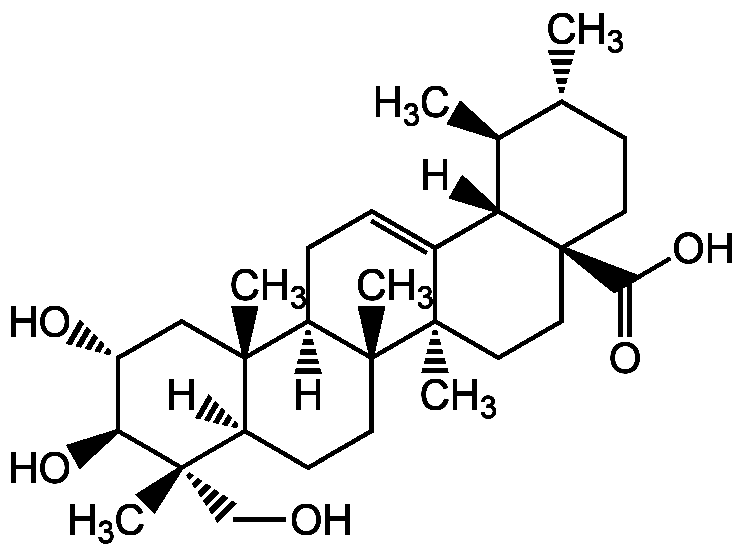
Chemical Structure
Asiatic acid [464-92-6]

AG-CN2-0400
CAS Number464-92-6
Product group Chemicals
Estimated Purity>95% (NMR)
Molecular Weight488.7
Overview
- SupplierAdipoGen Life Sciences
- Product NameAsiatic acid [464-92-6]
- Delivery Days Customer10
- CAS Number464-92-6
- CertificationResearch Use Only
- Estimated Purity>95% (NMR)
- Hazard InformationNon-hazardous
- Molecular FormulaC30H48O5
- Molecular Weight488.7
- Scientific DescriptionApoptosis inducer [1, 3]. Cell cycle arrest inducer [1]. Anticancer compound [1, 5] Antioxidant. Hepatoprotective [2]. Inhibits TGF-beta/Smad-mediated fibrogenesis [12]. Stimulates wound healing [4]. Anti-diabetic. Glycogen phosphorylase inhibitor [6]. Neuroprotective [13]. Modulates multiple targets associated with amyloid-beta precursor protein processing and amyloid-beta protein clearance. Down regulates BACE1 and increases ADAM10 maturation [7]. Anti-hyperglycemic compound [8, 14]. Anti-inflammatory and antinociceptive compound [9]. Antiangiogenic [10]. Acetylcholinesterase (AChE) inhibitor [11]. PPARgamma inhibitor through a C/EBPbeta-independent mechanisms [15]. Anti-osteoporotic. Inhibits adipogenic differentiation of bone marrow stromal cells (BMSC) [15]. - Chemical. CAS: 464-92-6. Formula: C30H48O5. MW: 488.7. Isolated from Centella asiatica. Apoptosis inducer. Cell cycle arrest inducer. Anticancer compound Antioxidant. Hepatoprotective. Inhibits TGF-beta/Smad-mediated fibrogenesis. Stimulates wound healing. Anti-diabetic. Glycogen phosphorylase inhibitor. Neuroprotective. Modulates multiple targets associated with amyloid-beta precursor protein processing and amyloid-beta protein clearance. Down regulates BACE1 and increases ADAM10 maturation. Anti-hyperglycemic compound. Anti-inflammatory and antinociceptive compound. Antiangiogenic. Acetylcholinesterase (AChE) inhibitor. PPARgamma inhibitor through a C/EBPbeta-independent mechanisms. Anti-osteoporotic. Inhibits adipogenic differentiation of bone marrow stromal cells (BMSC).
- SMILES[H][C@@]12CC[C@]3(C)[C@]([H])(CC=C4[C@]5([H])[C@@H](C)[C@H](C)CC[C@@]5(CC[C@@]34C)C(O)=O)[C@@]1(C)C[C@@H](O)[C@H](O)[C@@]2(C)CO
- Storage Instruction2°C to 8°C,-20°C
- UNSPSC12352200
References
- Asiatic acid, a triterpene, induces apoptosis and cell cycle arrest through activation of extracellular signal-regulated kinase and p38 mitogen-activated protein kinase pathways in human breast cancer cells: Y.L. Hsu, et al.; J. Pharmacol. Exp. Ther. 313, 333 (2005)
- Mechanism underlying mitochondrial protection of asiatic acid against hepatotoxicity in mice: J. Gao, et al.; J. Pharm. Pharmacol. 58, 227 (2006)
- Disruption of the endoplasmic reticulum and increases in cytoplasmic calcium are early events in cell death induced by the natural triterpenoid Asiatic acid: G.M. Gurfinkel, et al.; Apoptosis 11, 1463 (2006)
- Structure-activity relationship study of asiatic acid derivatives for new wound healing agent: B.S. Jeong; Arch. Pharm. Res. 29, 556 (2006)
- Asiatic acid induces colon cancer cell growth inhibition and apoptosis through mitochondrial death cascade: X.L. Tang, et al.; Biol. Pharm. Bull. 32, 1399 (2009)
- Synthesis and biological evaluation of asiatic acid derivatives as inhibitors of glycogen phosphorylases: L. Zhang, et al.; Chem. Biodivers. 6, 864 (2009)
- Withanolide A and asiatic acid modulate multiple targets associated with amyloid-beta precursor protein processing and amyloid-beta protein clearance: S.P. Patil, et al.; J. Nat. Prod. 73, 1196 (2010)
- Asiatic acid preserves beta cell mass and mitigates hyperglycemia in streptozocin-induced diabetic rats: J. Liu, et al.; Diabetes Metab. Res. Rev. 26, 448 (2010)
- Antinociceptive activities and the mechanisms of anti-inflammation of asiatic Acid in mice: S.S. Huang, et al.; Evid. Based Complement Alternat. Med. 2011, 895857 (2011)
- Asiatic acid inhibits pro-angiogenic effects of VEGF and human gliomas in endothelial cell culture models: C.V. Kavitha, et al.; PLoS One 6, e22745 (2011)
